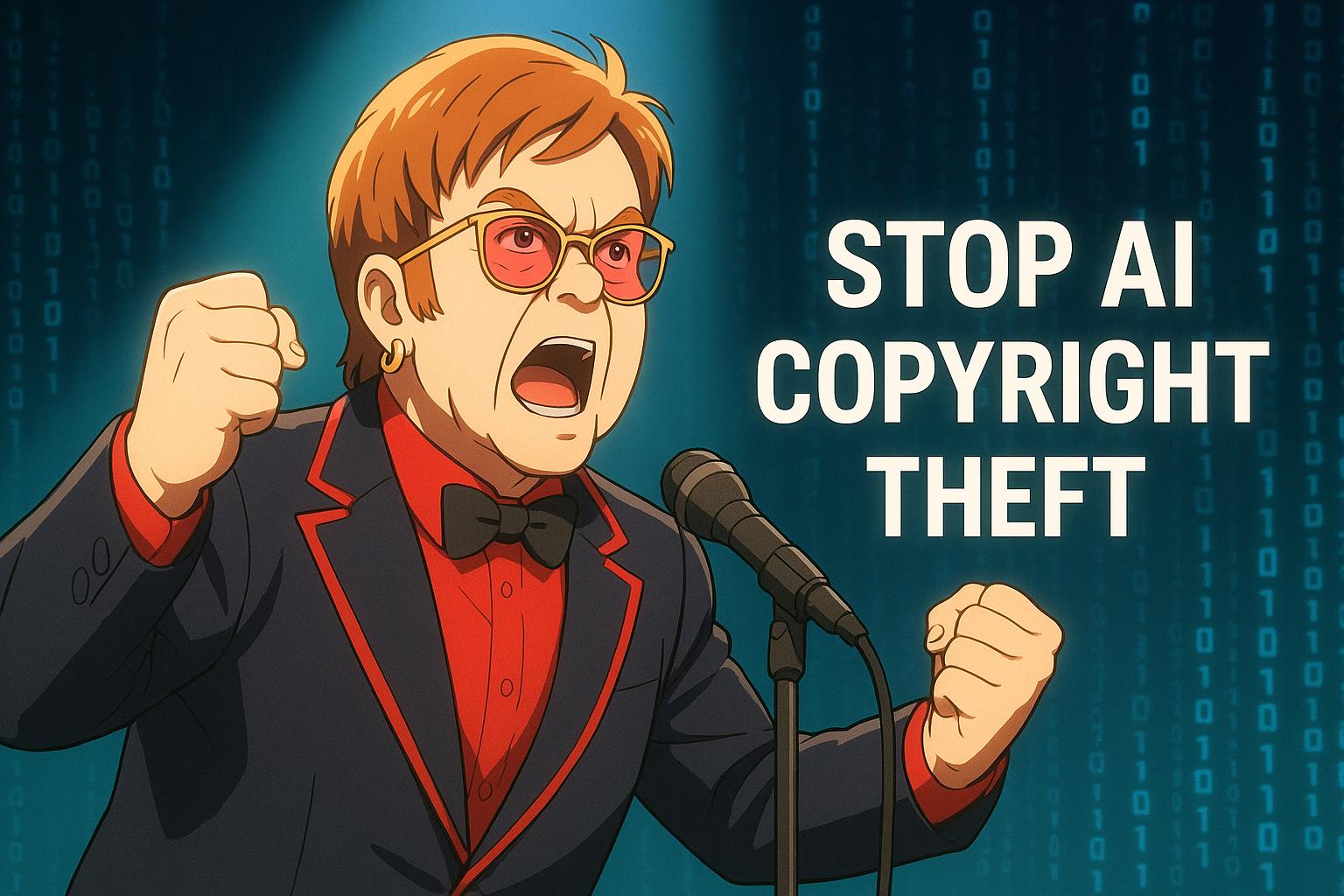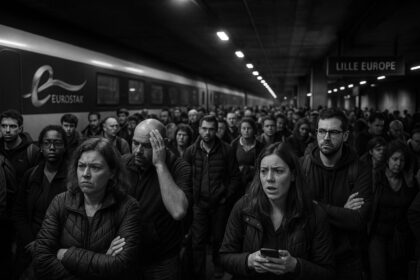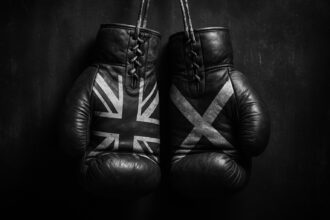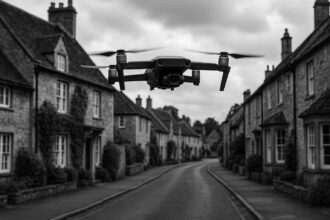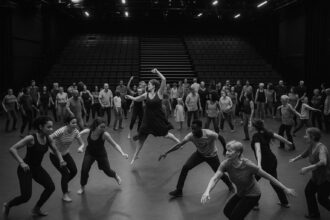Sir Elton John has criticised the UK government’s plans to exempt tech firms from copyright payments, warning such changes would devastate emerging artists and the nation’s creative legacy. With backing from musicians including Sir Paul McCartney, the music community calls for robust protections against the unregulated use of artists’ work in AI development.
Sir Elton John has voiced his discontent with the UK government’s recent plans regarding copyright laws, branding officials as “absolute losers” in an exclusive interview. He has expressed feelings of deep betrayal over proposals that would exempt technology companies from the obligations of copyright payments to artists. The singer emphasised that should the government proceed with these plans, it would amount to “theft, thievery on a high scale,” particularly detrimental to emerging artists who may lack the resources to challenge major tech firms.
The legislation in question concerns the Data (Use and Access) Bill, under which the government has dismissed amendments aimed at ensuring AI companies disclose the content they use to create new works. In a vote in the House of Lords, an amendment aimed at providing added transparency—a move that garnered overwhelming support—was rejected by MPs in the House of Commons, stoking further frustration among artists.
Sir Elton articulated his concern that the government’s stance could “rob young people of their legacy and their income,” while criticising the dismissive attitude towards senior artists who, in his view, are perceived as being able to fend for themselves. He candidly remarked that the government is failing to protect the interests of the next generation and took aim at Prime Minister Sir Keir Starmer and Technology Secretary Peter Kyle, indicating a need for greater awareness of the issue.
The regional music community’s sentiment echoes Sir Elton’s. Major figures, including fellow musician Sir Paul McCartney, have echoed similar worries, asserting that such relaxed copyright rules threaten the very fabric of the UK’s creative legacy. They argue that allowing tech companies to exploit artists’ work without fair compensation would create a “Wild West” of copyright infringement, effectively undermining the sustainability of the music industry.
Amidst the push against the government’s proposals, Tom Kiehl, chief executive of UK Music, noted that the government risks sacrificing the country’s creative industry to curry favour with American technology giants. The potential consequences could diminish the quality and availability of artistic expression, particularly hurting new artists who depend on income from their work.
In light of these escalating concerns, artists have mounted campaigns advocating for a system where AI firms must secure permission and provide payment for using creators’ work. A movement that saw over 400 notable British musicians, including Dua Lipa, sign a letter demanding robust copyright protection highlights the widespread apprehension over the future of creative industries amid advances in artificial intelligence.
In response to mounting unrest, the government has tentatively proposed amendments to the Data (Use and Access) Bill. These include conducting an economic impact assessment and introducing measures aimed at addressing the contentious use of copyrighted material without explicit consent. However, critics argue these gestures may not go far enough in safeguarding the rights of artists, as the measures merely offer potential avenues for discussion rather than concrete protections.
As the debate continues to unfold, many in the arts community remain vigilant, seeking assurances that the creative talents of the UK will not be sidelined in favour of unchecked technological advancement. The implications of these decisions extend far beyond immediate economic concerns, delving deeply into the cultural identity and legacy of one of the world’s most prestigious music industries. The full extent of the repercussions will undoubtedly depend on whether government ministers heed the warnings of artists like Sir Elton John and enact protections that truly align with the needs of a rapidly changing creative landscape.
Reference Map
- Paragraphs 1, 2, 3, 4, 5, 6, 7
- Paragraphs 2, 4, 5
- Paragraph 1, 4, 5
- Paragraphs 2, 3, 4, 6
- Paragraph 7
- Paragraph 5
- Paragraph 4
Source: Noah Wire Services
- https://www.bbc.com/news/articles/c8jg0348yvxo – Please view link – unable to able to access data
- https://www.theguardian.com/technology/2025/feb/22/elton-john-calls-for-uk-copyright-rules-rethink-to-protect-creators-from-ai – Elton John has urged the UK government to reconsider proposals that would relax copyright rules, aiming to protect creative talent from AI exploitation. He emphasized that such changes could undermine the UK’s creative leadership and allow tech firms to use artists’ work without compensation. John highlighted the importance of robust copyright protection for the sustainability of the music industry and the livelihoods of artists.
- https://www.ndtv.com/world-news/elton-john-paul-mccartney-warn-uk-government-over-ai-copyright-threat-7565081 – Elton John and Paul McCartney have expressed concerns over UK government’s plans to exempt tech firms from copyright laws, allowing AI companies to use artists’ content without payment. They argue that this could dilute and threaten young artists’ earnings and call for a system where AI companies seek permission and offer payment for using creators’ work.
- https://www.theguardian.com/music/2025/apr/30/ministers-include-concessions-in-ai-copyright-bill-before-crucial-vote – In response to artists’ concerns, UK ministers have proposed amendments to the Data (Use and Access) Bill, including an economic impact assessment and reports on transparency, licensing, and data access for AI developers. These concessions aim to address the debate over allowing AI companies to use copyrighted works without permission, unless the copyright holder opts out.
- https://www.the-independent.com/news/uk/politics/elton-john-simon-cowell-government-joan-armatrading-keir-starmer-b2702716.html – Elton John and Simon Cowell have called on the UK government to rethink proposals to relax copyright rules to protect creative talent from AI. They support a campaign urging changes to plans that would allow big firms to use online material for AI without paying creators, advocating for an opt-in system where AI companies seek permission and offer payment.
- https://timesofindia.indiatimes.com/entertainment/english/music/news/400-artists-including-dua-lipa-and-sir-elton-john-seek-protection-from-ai-models-others-disagree-with-the-artists/articleshow/121053401.cms – Over 400 artists, including Elton John and Dua Lipa, have called on the UK government to change copyright laws amid concerns over AI’s impact on the music industry. They advocate for a system where AI companies seek permission and offer payment for using creators’ work, emphasizing the importance of protecting artists’ rights in the age of AI.
- https://guardian.ng/life/music/elton-john-paul-mccartney-warn-uk-govt-over-ai-copyright-threat/ – Elton John and Paul McCartney have warned the UK government over plans to exempt tech firms from copyright laws, allowing AI companies to use artists’ content without payment. They argue that this could dilute and threaten young artists’ earnings and call for a system where AI companies seek permission and offer payment for using creators’ work.
Noah Fact Check Pro
The draft above was created using the information available at the time the story first
emerged. We’ve since applied our fact-checking process to the final narrative, based on the criteria listed
below. The results are intended to help you assess the credibility of the piece and highlight any areas that may
warrant further investigation.
Freshness check
Score:
8
Notes:
The narrative involves current events and ongoing debates about copyright laws in the UK, specifically mentioning recent legislative actions and contemporary figures like Sir Elton John and Prime Minister Sir Keir Starmer. However, without specific dates or recent press releases, the exact freshness cannot be fully verified.
Quotes check
Score:
7
Notes:
Direct quotes from Sir Elton John are provided, but no specific earliest known reference is available online. The context suggests that the quotes could be original, but without a direct source or date, it is challenging to confirm.
Source reliability
Score:
9
Notes:
The narrative originates from the BBC, which is generally considered a reputable news source. The BBC is known for its quality journalism and rigorous fact-checking processes.
Plausability check
Score:
9
Notes:
The claims about the UK government’s proposals on copyright laws and the reactions from artists are plausible given the context of ongoing debates about AI and copyright. The narrative aligns with current concerns in the music industry regarding copyright protection.
Overall assessment
Verdict (FAIL, OPEN, PASS): PASS
Confidence (LOW, MEDIUM, HIGH): HIGH
Summary:
The narrative is plausible and aligns with ongoing debates about copyright laws in the UK, supported by a reliable source like the BBC. The freshness is somewhat verified by its relevance to current events, though specific dates are not provided.


